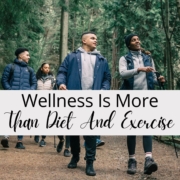Oxytocin’s Role In Navigating Perimenopause And Beyond
As women enter perimenopause and menopause, the changes in their bodies can be both physically and emotionally challenging. Hormones like estrogen and progesterone receive a lot of attention in this season. Yet, there is another crucial hormone that plays a significant role in navigating perimenopause and beyond.
Known by many as the “love hormone,” oxytocin is not just about bonding and affection—it also has profound effects on stress management, mood regulation, and overall well-being.
My goal is to bring you information on how oxytocin impacts women during perimenopause and menopause, and how to boost it. I believe that understanding this hormone can lead to a more balanced and fulfilling experience during these transitional years.
Oxytocin’s Role In Stress Management & Emotional Well-being
There are many sources of stress– in the lives of women in perimenopause and menopause. Beyond the hormonal fluctuations, women at this age may also be experiencing an empty nest, job changes, or aging parents, all of which can increase stress and anxiety. Oxytocin helps to inhibit cortisol, the body’s primary stress hormones, and is essential for emotional stability.
Beyond the love and bonding hormone, Oxytocin also contributes to feelings of trust and empathy. This can be particularly beneficial during life stages that may feel isolating or overwhelming.
Oxytocin’s Influence On Physical Health
Women experiencing the fluctuations of perimenopause often experience higher levels of stress from physiological changes or upheaval in their relationships. Elevated stress interferes with melatonin which should rise at night to play a part in sleep. By lowering cortisol, oxytocin aids in allowing melatonin to rise which helps with sleep.
Many women find themselves struggling to regulate their appetite and control insulin resistance, the primary cause of diseases such as diabetes. When struggling with feelings of isolation and mood swings, it’s not unusual to find temporary relief in the refrigerator or pantry. I’ve heard it said that food is the perfect lover. But is it?
Those comfort foods we reach for are usually processed carbohydrates which cause a spike in blood sugar. Repeatedly consuming foods that spike blood sugar promotes insulin resistance and weight gain. An effective counter to seeking solace in food is boosting your oxytocin levels.
Recent studies have shown that oxytocin also plays a part in bone health. The exact mechanism is not fully understood, but oxytocin promotes the function of osteoblasts, leading to bone formation.
Practical Ways To Enhance Oxytocin Naturally
- Yoga provides a good balance of meditative breathing, stretching, and movement that reduces stress and anxiety, and improves sleep.
- Listening to music that has a slow, calming tempo can increase oxytocin, or if you are a musician, create your own soothing music.
- Physical touch boosts oxytocin. You can hold hands, sit close to someone special, give a massage, cuddle, or be intimate.
- Play with or snuggle a pet to boost your oxytocin.
- Meet with a close friend for coffee and conversation, or talk while you walk outside.
- Explore compassion meditation – where you focus positive thoughts toward someone specific.
- Do something nice for someone. Buy a coffee for the person in line behind you, or choose a different random act of kindness.
- Diffuse essential oils such as Clary Sage to raise oxytocin levels.
Nutritional Support Of Oxytocin
There are a number of nutrients that play a part in the synthesis of oxytocin, including Vitamin D, Vitamin C, and Magnesium.
- Vitamin D is made in your skin when you are exposed to sunshine. It is most effective when at least half of your body is not covered, and you are not wearing sunscreen. Wild-caught salmon provides the most Vitamin D in a food source, but even that can be limited. During the winter months in northern climates, it is most effective to supplement with Vitamin D3.
- Vitamin C is available in citrus fruit, watermelon, avocado, blueberries, and broccoli.
- Magnesium is found in pumpkin and leafy green vegetables, but conventional farming practices have stripped a lot of it from our soil. I recommend taking 400mg of a Magnesium Glycinate or Malate supplement daily, especially if you are using a Vitamin D3 supplement. The body can use up its stores of Magnesium as it utilizes Vitamin D.
Which of these activities will you incorporate into your day to enhance your levels of oxytocin? You can change your approach to see what most resonates with you.
And you don’t have to be in perimenopause or menopause to benefit. Male and female – whatever your age – will benefit from regularly integrating physical touch, social connections, and mindful relaxation into your life.










Very helpful info. Kelly! Thank you.
I’m glad you found the article helpful.